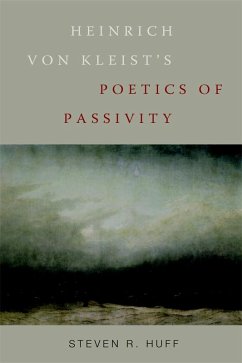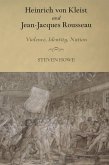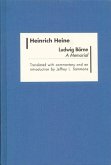An investigation of the structures of passivity in Kleist's work, which can be viewed as constituting a kind of poetics.
Controversial during his lifetime as well as among today's scholars and critics, the German dramatist and writer of novellas Heinrich von Kleist (1777-1811) remains an enigma. Was he a Romantic or a Classic? A conservative or a liberal? What is his status in the literary canon? Because of their enigmatic qualities, Kleist's writings have attracted the attention of critics and theorists from well beyond the narrow confines of German literary studies: comparatists, historians, philosophers, legal scholars, and even musicologists and dance historians. And outside academia his writings are as popular as ever.
This book scrutinizes for the first time a key element in Kleist's thought and poetic process: his obsession with the problem of passivity. Scholars have long been attracted to the dynamic, larger-than-life characters in Kleist's fiction and drama, overlooking the fact that Kleist's works often turn on moments of stasis, as these same protagonists are suddenly and sometimes brutally rendered passive. Through a careful, historically grounded, and original investigation incorporating extensive primary research in late-Enlightenment natural philosophy and eighteenth-century medical practices, the study sheds light on these nodal points in Kleist's work, contending that these structures of passivity are so pervasive and so systematic in his work that theycan justifiably and profitably be viewed as constituting a kind of poetics.
Steven R. Huff is Associate Professor in the Department of German at Oberlin College.
Controversial during his lifetime as well as among today's scholars and critics, the German dramatist and writer of novellas Heinrich von Kleist (1777-1811) remains an enigma. Was he a Romantic or a Classic? A conservative or a liberal? What is his status in the literary canon? Because of their enigmatic qualities, Kleist's writings have attracted the attention of critics and theorists from well beyond the narrow confines of German literary studies: comparatists, historians, philosophers, legal scholars, and even musicologists and dance historians. And outside academia his writings are as popular as ever.
This book scrutinizes for the first time a key element in Kleist's thought and poetic process: his obsession with the problem of passivity. Scholars have long been attracted to the dynamic, larger-than-life characters in Kleist's fiction and drama, overlooking the fact that Kleist's works often turn on moments of stasis, as these same protagonists are suddenly and sometimes brutally rendered passive. Through a careful, historically grounded, and original investigation incorporating extensive primary research in late-Enlightenment natural philosophy and eighteenth-century medical practices, the study sheds light on these nodal points in Kleist's work, contending that these structures of passivity are so pervasive and so systematic in his work that theycan justifiably and profitably be viewed as constituting a kind of poetics.
Steven R. Huff is Associate Professor in the Department of German at Oberlin College.
Dieser Download kann aus rechtlichen Gründen nur mit Rechnungsadresse in A, D ausgeliefert werden.









